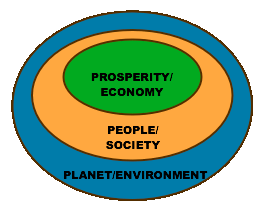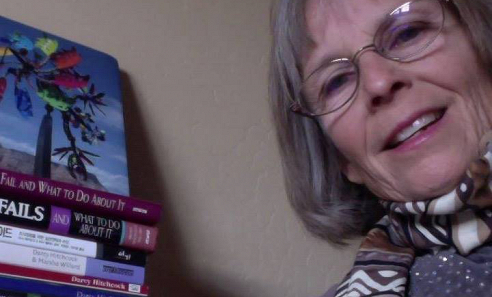It's certainly true that our society is wholly dependent upon nature, our economy is a "wholly-owned subsidiary of Nature," as Ray Anderson, the visionary owner of Interface, liked to say. It's probably most accurate to see these as concentric circles, with Environment the largest, then Society and then our Economy as a subset of our society.
What is social sustainability?
We can't get to environmental sustainability without getting people on board, without meeting human needs.
We're so clever, we find ways to circumvent natural limits that other species face. We go ahead and meet our needs unsustainably, if we have to. If you were a Brazilian farmer who had to burn down some rain forest to feed your kids, you'd do it, right? If you have to get into a fossil-fuel driven car to get to work to feed your family, you do it. "Now" matters more to us humans than long-term impacts, especially when we're in crisis.
So the end-game is finding a way that we can all have a good life within the limits of nature.
Sounds good, but still a bit vague, right? To make matters worse, what determines a good quality of life varies. In underdeveloped nations, access to clean water and sanitation is key. In the developed world, we've developed a dizzying array of things we think we need to be happy. So for now, let's examine social sustainability at the community level. We may not be able to meet everyone’s wishes but our community needs to stay healthy and resilient.
Think of social sustainability as quality of life. What in your community is undermining the quality of life for those who live and work in the community?
Sedona’s Social Sustainability Issues
Let me use Sedona as an example. The City is already working on two big priorities that are part of social sustainability:

Traffic: Traffic jams are a huge headache for people in the community; they affect how we feel; just yesterday I talked to someone who moved to Cottonwood because of it; and of course it has environmental and economic impacts as well like air pollution and days I shop or eat out in Cottonwood so I don’t have to drive to West Sedona from Village of Oak Creek. And I'm sure our three million visitors don't like sitting in hour-long traffic jams during high-season and holidays. It's also bad for business.
Lack of workforce housing: Many people who work here can’t afford to live here; this is an interconnected problem between the types of jobs here, wage scales, cost of real estate vs rent that can be charged. Having to commute (especially in bad traffic...do you see how everything is connected?) requires that people of modest means must own a car or spend hours on public transit, away from their family.
We have some other social challenges in Sedona, of course, including hunger and homelessness. Our education system seems to be struggling because our state doesn't fund it as well as most other states. The transient nature of our community (people who live here part time, where this is not ‘home’, as well as being a retirement community) has an impact on social cohesion or social capital which can be important assets when the community needs to come together to get things done. Sedona isn’t very walkable, which affects people’s health and requires they get in their car. So the work the City is doing around urban planning, to create walkable centers, is also a social sustainability initiative.
Other communities have different social sustainability issues, things like crime levels, drug abuse, food deserts (where people can’t get easy access to fresh food), rates of obesity, etc.
Choose solutions that make everything better
The problem with how our society has operated in the past is that we treat each P as if it’s independent from the others. How government is structured is a great example: we have the Dept. of Human Services, Dept. of Environmental Quality, and the Dept. of Commerce. Sustainability recognizes the interdependencies. We don’t want social solutions that tank the economy or destroy the environment, which will come back to undermine human needs. We can’t have an economy that destroys the environment people come to see.
So here's the trick: find solutions for our social challenges that also help the economy and the environment (or at least that don't make them worse.) That's the special sauce of sustainability, seeking solutions that make everything better: People, Planet, Prosperity. All three. Avoid framing options as trade-offs (eg, “Jobs or the Environment.”)
So how do we, for example, fix traffic in Sedona while making the other P's better? We certainly don't start by widening or building more roads for more cars. Instead, we can:
• Build a better transit system to handle all the tourists which would make their visit more enjoyable, one that would explain what they're seeing and make it easy to start hiking from one trail head and get picked up at another. Imagine something like the Red Rock Trolley coming every 15 minutes like clockwork, stopping at all the major hotels, destinations and trailheads.
• Encourage the formation of a new business that would rent 'neighborhood electric vehicles' like the solar-powered ELF, so tourists and locals can buzz around in bike lanes or rarely used sidewalks. Then the drivers can stop to snap pictures whenever they want (instead of filming out their sunroof while they drive down 179; we’ve all seen them do it).
• Help tour companies to collaborate on scheduling transportation, perhaps through an online app. "Done with your trip to the local wineries? A tour to Honanki is leaving in 10 minutes. Click here to learn about that archeological site."
These more sustainable solutions (vs. widening or building more roads) create new economic opportunities, improve the visitor experience, and reduce greenhouse gases.
People, Planet, Prosperity: Win, Win, Win.

About the author:
Darcy Hitchcock loved nature since she was a little girl. She was also an entrepreneur and enjoyed teaching. So it’s no wonder she became a sustainability consultant. She describes herself as a rebel in a business suit, advocating for organizational democracy and sustainability for over a quarter century. She's published 10 books, including The Business Guide to Sustainability (now in its third edition) which won an award from the American Library Association and was translated into Korean. She has delivered keynote addresses in Mexico, Qatar and Russia. For five years she taught at Bainbridge Graduate Institute’s Sustainable MBA. And she co-founded the International Society of Sustainability Professionals where she still teaches online classes to an international audience on sustainability assessments. She currently is leading the Sustainability Alliance, a coalition of local non-profits driving the Verde Valley toward sustainability.








